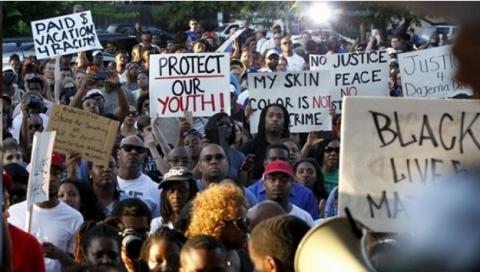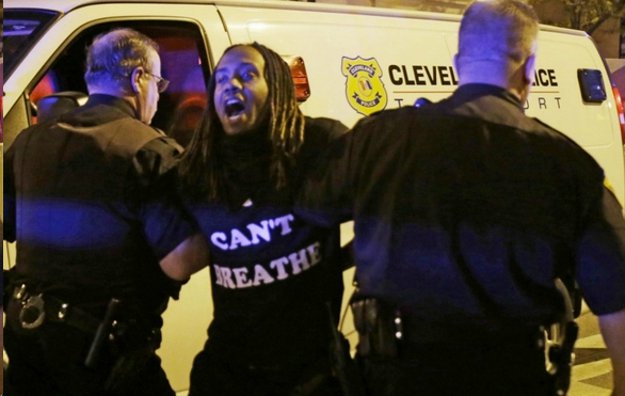The Trump Administration and the Problem of Small-Town Police Abuses

ProPublica
This is an excerpt from an article originally published in the September 10, 2018 print edition of The Louisiana Weekly newspaper.
On a chilly morning in December 2016, 12-year-old Bobby Lewis found himself sitting in a little room at the police station in Ville Platte, a town of 7,300 in southern Louisiana. He wasn’t sure exactly how long it had been, but the detective grilling him had been at it for some time. Bobby was a middle school student — a skinny kid with a polite demeanor — and though he got in trouble at school from time to time, he wasn’t used to getting treated like this. He was alone, facing the detective without a parent or a lawyer.
A blank piece of paper sat on the table in front of Bobby. He and his friends were thieves, the detective insisted. They sold drugs. They trafficked guns. The detective brushed off Bobby’s denials. She knew what he was up to, and if he didn’t write it all down — inform on his friends and confess to his crimes — she’d charge him. She’d confiscate his dog, Cinnamon, she told him. She’d throw his mother in jail. Bobby was nothing but a “B” and an “MF,” as he later relayed the detective’s words to me, sheepish about repeating them. When his mother finally turned up at the station house, it seemed only to enrage the detective further. “Wipe that fucking smile off your face, and sit up in that fucking chair,” Bobby and his mother recall the detective barking at him.
Earlier that day, Bobby told me, he had been walking home from a friend’s house when a police cruiser pulled up alongside him. He recognized one of the officers. Her name was Jessica LaBorde, but like most people in Ville Platte, Bobby knew her only as Scrappy. The sobriquet was too fitting not to stick. Profanity prone in the extreme, LaBorde was known for her tinderbox temper and hostile disposition. She styled herself like a Marine drill sergeant — fastidiously pressed police blues, jet-black hair pulled back tight — and she would become Bobby’s interrogator. (LaBorde did not respond to calls or a detailed list of questions about the incident.)
Somebody had put a rock through a window in one of the abandoned houses that litter Ville Platte, and a neighbor had seen three boys taking shelter from the rain under a carport nearby. But, the neighbor later told Bobby’s mother, Charlotte Lewis, he didn’t know which of the boys had thrown the rock. Bobby admitted he had been there but insisted he wasn’t the culprit.

Police need probable cause — evidence sufficient to show there’s a fair likelihood that a person committed a crime — to take someone into custody. Generally, an officer can’t detain somebody just because that person was near the scene of a crime. “Mere propinquity,” the U.S. Supreme Court has written, “does not, without more, give rise to probable cause.” Whether LaBorde didn’t know that or didn’t care, she ordered Bobby into the back of her squad car.
LaBorde didn’t call Bobby’s mother to tell her that her 12-year-old was in custody, according to a complaint Lewis later filed with the police department. But eventually another officer did. Lewis says she told the officer not to let anybody question her son until she got there. She had to wait out a morning downpour before she could walk to the station house.
Lewis was familiar with LaBorde’s rough reputation. Still, she told me, she was shocked by how her son was treated. “She cussed him out like he’s a stray dog,” she said. “It’s like my child is a convict or a criminal.” After two hours of pressing Bobby fruitlessly, LaBorde finally let him go — but not before charging him with criminal mischief, police records show. (A judge later dismissed the charge, Lewis told me; a friend admitted throwing the rock.)
Two weeks later, on Dec. 19, the U.S. Department of Justice issued a scathing report on policing in Ville Platte and surrounding Evangeline Parish. The investigation found that, for decades, the city Police Department and the parish Sheriff’s Office maintained an unwritten policy of jailing people without probable cause — for days and even weeks at a time — to pressure them to cooperate with law enforcement. These “investigative holds” ensnared anybody who might know something about criminal activity, from a suspect to a potential witness to a suspect’s relatives. As the Justice Department report put it, “Literally anyone in Evangeline Parish or Ville Platte could be arrested and placed ‘on hold’ at any time.” Many were. From 2012 to 2014 alone, the police unlawfully held at least 700 people in Ville Platte — close to a tenth of the town’s residents.

That, the report concluded, amounted to “a pattern or practice of unconstitutional conduct.” To end this cycle of abuses, the report prescribed an array of institutional changes to eliminate investigative holds, such as imposing new department protocols and overhauling training regimens.
The case wasn’t merely about Ville Platte. The Justice Department lawyers viewed it as a template. Similar policing practices exist in scores of towns and villages across the country, and Justice Department officials selected Ville Platte precisely because it was a pure embodiment of a widespread problem. They hoped it would provide a model for reform at other police departments.
Justice Department officials planned to negotiate a consent decree — a long-term reform plan supervised by a federal judge — with local officials. Systemic police reform was a defining feature of the Obama-era Justice Department, which considered judicial oversight key to dislodging unlawful practices as firmly entrenched as investigative holds were in Ville Platte.
But Jeff Sessions, who took office as attorney general just months after the Justice Department report, has a different view. He considers his predecessors’ reform efforts, particularly via consent decree, to be gross federal overreach that denigrates and demoralizes police. Sessions all but declared that the Justice Department was getting out of the business of meaningful police reform. There would be no consent decree in Ville Platte. Instead, the result is what former Justice Department officials say is an anemic reform plan, announced in June, that largely leaves the future of policing there to the police.
There’s little reason, they say, to expect that this plan will induce law enforcement in Ville Platte to change its ways. The town’s policing culture is defined by arbitrary arrest and detention — and it has been for a long time. It’s a culture that’s proven intensely resistant to change. “You do what you know,” one former Ville Platte police official told me. “And that’s all they know.”
This is an excerpt from an article originally published in the September 10, 2018 print edition of The Louisiana Weekly newspaper.
Highbrow Magazine






























































































































































































































































































































